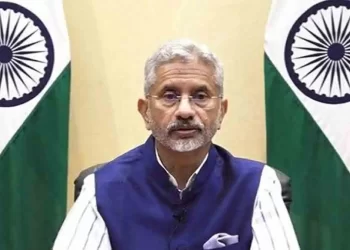Pakistan’s aerial attacks on Jammu and various military facilities near the western border were effectively prevented by India’s air defence systems on Thursday night, with the armed services claiming no damage had occurred.
The attempted strike, which included drones and missiles, resulted in blackouts and sirens in numerous districts of Jammu and Kashmir, Punjab, and Rajasthan. Authorities warned locals to stay home and be cautious as emergency measures were implemented. The Indian Premier League 2025 match between the Punjab Kings and the Delhi Capitals at the HPCA Stadium in Dharamshala was called off in the middle of the game as a precaution.
According to the Integrated Defence Staff, there was no damage to military stations in Jammu and Udhampur.
“Military Stations of Jammu, Pathankot and Udhampur in proximity to the International Boundary, in Jammu & Kashmir targeted by Pakistan using missiles and drones. No losses. Threat neutralised by #IndianArmedForces as per SoP with kinetic & non-kinetic means”, the IDS said in a post on X.
According to sources, the Indian air defences neutralised several drones launched near the Jammu airport, with no casualties reported.
Moreover, eight missiles were intercepted near Jammu – all of them successfully destroyed, according to media reports. The attack also caused a temporary blackout at the Vaishno Devi shrine in Reasi district, with similar power outages reported in Srinagar under heightened security measures.
Union Home Minister Amit Shah has spoken with the directors general of border guarding troops to assess the situation. He also spoke with the CISF Director General about airport security.
The Home Minister also spoke with Jammu and Kashmir’s Lieutenant Governor, Manoj Sinha, and Director General of Police, Nalin Prabhat.
Following the assaults, India purportedly took retaliatory action against Pakistan.
According to NDTV, an Indian surface-to-air missile defence system shot down a Pakistan Air Force F-16 supersonic fighter jet this evening.
The F-16 took off from the Sargodha air base and was shot down near there, according to sources.
External Affairs Minister S. Jaishankar spoke with counterparts from several countries, including the United States, late Thursday night, asserting India’s strong resolve to firmly counter any attempts at escalation being made by Pakistan.
Meanwhile, UN Secretary-General Antonio Guterres encouraged efforts to de-escalate the India-Pakistan confrontation there, according to his Deputy Spokesperson Farhan Haq.
“Certainly, we encourage all efforts to de-escalate the situation, and encourage both India and Pakistan to exercise maximum restraint,” Haq said.
International diplomatic efforts were afoot to douse confrontation with US Secretary of State Marco Rubio speaking to Pakistan Prime Minister Shahbaz Sharif and India’s External Affairs Minister S Jaishankar, while Iran’s Foreign Minister Abbas Araqchi and Saudi Arabia’s Minister of State for Foreign Affairs Adel al-Jubeir were in New Delhi on a diplomatic mission.
Haq reiterated: “The world cannot afford another conflict between India and Pakistan, and he (Guterres) has offered his good offices” to help de-escalate the situation.
This offensive by Pakistan came just hours after its earlier attempt to target 15 Indian cities was thwarted.
Army officer Colonel Sofiya Qureshi and Air Force Wing Commander Vyomika Singh confirmed that cities and towns such as Awantipora, Srinagar, Jammu, Pathankot, Amritsar, Kapurthala, Jalandhar, Ludhiana, Adampur, Bathinda, Chandigarh, Nal, Phalodi, Uttarlai, and Bhuj were on the target list. However, India’s integrated counter-UAS grid and robust air defence systems successfully neutralised all threats. Debris recovered from various locations confirmed that the drones and missiles originated from Pakistani territory.
In a rapid retaliatory strike, Indian soldiers attacked and destroyed multiple Pakistani air defense systems, including a critical facility in Lahore. Meanwhile, Pakistan’s military launched unprovoked shelling in Jammu and Kashmir’s Kupwara, Baramulla, Uri, Poonch, Mendhar, and Rajouri sectors using heavy artillery and mortars. This assault resulted in the terrible deaths of 16 civilians, including five children and three women. The Indian Army responded forcefully and proportionally.
Previously, as part of Operation Sindoor, India conducted precise airstrikes on nine terrorist camps in Pakistan and Pakistan-occupied Kashmir, killing an estimated 100 militants.
Source: IANS







 Finance
Finance







